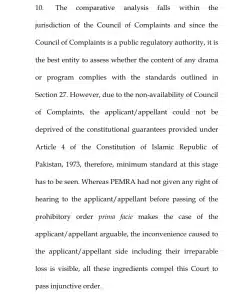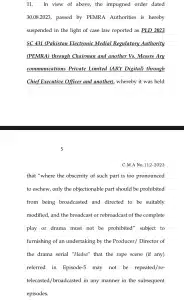[vc_row][vc_column][vc_column_text dp_text_size=”size-4″]Islamabad High Court (IHC) has issued a ruling that has overturned the ban on the controversial television series “Hadsa.” The ban had been imposed by the Pakistan Electronic Media Regulatory Authority (PEMRA) due to allegations that the show had exploited the traumatic experience of the motorway rape survivor.
The court’s decision also includes specific instructions that the explicit scene from Episode 5, depicting the controversial gang rape, should not be repeated or broadcasted in the upcoming episodes of the series. This ruling from the IHC has sparked a variety of reactions across the country.

A legal expert named Reema Omar posted a clip of the judgment on her Twitter account, emphasizing the fact that PEMRA had not consulted with the creators of the drama before imposing the ban. The court acknowledged the “inconvenience caused to the applicant/appellant side, including their irreparable loss,” which influenced its decision to issue an injunctive order.
Previously: PEMRA Blocks Airing Of Drama Hadsa Linked To Motorway case
The controversy surrounding “Hadsa” initially began in August when journalist Fareeha Idrees shared her conversation with the motorway rape survivor. The survivor expressed her distress at not being consulted by the show’s creators before the controversial scene was aired, leading to a widespread public outcry and a request for authorities to take down the drama.

While many netizens had supported PEMRA’s decision to ban the show, the show’s star, Hadiqa Kiani, along with producers Wajahat Rauf and Shazia Wajahat, argued that “Hadsa” was not based on the life of the motorway survivor. They asserted that the primary purpose of the screenplay was to raise awareness about the traumatic experiences faced by rape survivors.



The Islamabad High Court’s decision to reverse the ban has generated a range of reactions from the public, highlighting the ongoing debate about how sensitive subjects are portrayed and the role of regulatory bodies in monitoring content. This ruling raises questions about artistic freedom, responsible content creation, and the need for greater sensitivity when addressing delicate topics in the media.[/vc_column_text][/vc_column][/vc_row]











